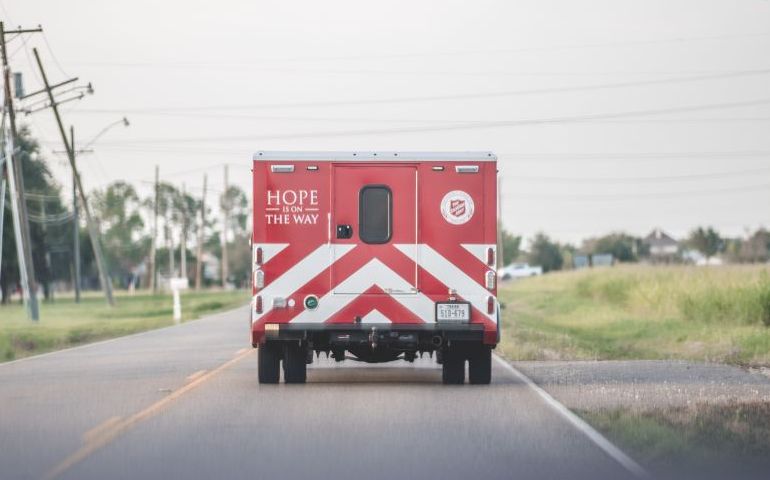The Salvation Army Meeting Mounting Need After Hurricane Ida
Bradley Rowland | brad.rowland@uss.salvationarmy.org | (404) 728-1300

Hurricane Ida is continuing to affect additional regions in the United States. The death toll has risen substantially, millions of Americans are still without power, and now many more are experiencing severe flooding and tornado activity in New England.
In response to Ida’s widespread impact, The Salvation Army has expanded their massive operation further to meet immediate need through feeding, sheltering, emotional and spiritual care, and other services for survivors and first responders as widespread power outages and flooding affect Louisiana, Pennsylvania, New York, and New Jersey. Trained emergency response teams are providing meals, water, supplies and care to the affected areas, with additional resources on the way.
“The Salvation Army’s presence in every zip code of the United States makes us uniquely capable of mobilizing for this disaster event,” said Commissioner Kenneth G. Hodder, National Commander of The Salvation Army. “We were preparing response efforts before the storm made landfall, and we will be helping these communities recover long after the flood waters recede."
Disaster Preparedness Overview (September 3, 2021 | As of 1 p.m. ET)
Southern Territory Response:
- Trained emergency response teams in Louisiana have already provided:
- 59,965 meals
- 22,798 snacks
- 46,467 drinks
- 2,567 emotional and spiritual care meetings
- 1,200 comfort and hygiene kits
- 133 cases of water
- 60 cleaning supplies and tools.
- As of today, 40 mobile feeding units are now committed to Hurricane Ida relief operations and are serving food, drinks, supplies and emotional and spiritual care to survivors and first responders.
- Each mobile feeding unit can serve 500 to 1,500 meals per day.
- Thirteen feeding locations within the city of New Orleans have been identified; The Salvation Army will provide food and drinks at these locations for as long as they are needed.
- Fixed feeding locations have been established in Albany, Baton Rouge, Hammond, and Houma.
- Roaming feeding trucks are serving in Bayou Blue, Bayou Dularge, Charvin, Cut Off, LaPlace, LaRose, Napoleonville, and Raceland.
- The Salvation Army currently has 133 disaster workers assigned to Hurricane Ida relief in the south, who have already given over 5,954 hours of service.
- Staging centers for relief supplies and assets have been established in Beaumont, TX and Jackson, MS and two incident management teams with personnel drawn from Alabama, Florida, Louisiana, Mississippi, and Texas) are running relief operations from Incident Command Posts in New Orleans and Gonzales.
- The Salvation Army is working in partnership with the Southern Baptists who will be deploying three field kitchens with the capacity to serve 30,000 meals.
Eastern Territory Response:
- Because the remnants of Hurricane Ida came so shortly after Hurricane Henri impacted northeastern states, many communities were at an increased risk of flooding which could limit the ability of relief teams to reach those in need.
- Multiple Salvation Army facilities have incurred flood damage.
- Incident command centers have been established in Pennsylvania, New Jersey, and New York.
- The Salvation Army is partnering with city and state officials to determine impacts and coordinate response efforts.
- Mobile feeding units have been staged for deployment to serve food, drinks, and emotional and spiritual care to survivors and first responders.
- Fixed Salvation Army locations are being prepared to provide feeding and other needed support to those affected.
- Cleanup kits are being distributed to Salvation Army locations to use in affected areas.
- Emergency shelters are being created to meet immediate needs.
For more information on The Salvation Army’s continued response, visit disaster.salvationarmyusa.org. To make a financial gift and support Hurricane Ida relief:
- Visit give.helpsalvationarmy.org
- Call 1-800-SAL-ARMY (1-800-725-2769)
- Text GIVE to 52000 to donate $10 automatically through your cell phone bill
The Salvation Army annually helps more than 30 million Americans overcome poverty, addiction, and economic hardships through a range of social services. By providing food for the hungry, emergency relief for disaster survivors, rehabilitation for those suffering from drug and alcohol abuse, and clothing and shelter for people in need, The Salvation Army is doing the most good at 7,600 centers of operation around the country. In the first-ever listing of “America’s Favorite Charities” by The Chronicle of Philanthropy, The Salvation Army ranked as the country’s largest privately funded, direct-service nonprofit. For more information, visit www.SalvationArmyUSA.org. Follow us on Twitter @SalvationArmyUS and #DoingTheMostGood.